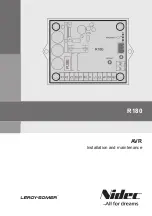
INSTALLATION and OPERATION INSTRUCTIONS
ECO-FEEL - IAQ WALL CONTROL
CAUTION
Failure to comply with the following can cause erratic operation of the unit:
Disconnect the power to the HRV/ERV unit before installing the ventilation control. Ensure that power is reconnected once ventilation control has been
installed. Failure to disconnect power before installation could damage the Controller.
•
Never install more than one central ventilation control per unit.
•
Keep control low voltage wiring at least 1 foot (305mm) away from motors, lighting ballasts and light dimming circuits. Do not route control wiring alongside
house power wiring.
•
Ensure the wires are securely connected to the unit and wall control.
For optimal operation of the ventilation control, the following best practices are recommended during installation:
•
The location of the ventilation control could affect the optimum performance. Therefore, it is recommended that the wall control be installed in a central location,
away from direct sunlight and other sources of direct heat or cold such as an outside wall or adjacent to windows.
•
Do not install ventilation controller on wall where cavity is opened to other areas. Example: Furnace return in wall cavity. If so, seal the back plate center opening with tape.
Item #: 445233
Rev Date: 2020-01-31
PRESS TAB
TO DETACH
SIGNAL WIRES
1
2
3
4
5
3.0mm
SLOT/FLAT HEAD
SCREWDRIVER
(FRONT MODULE
BACKSIDE)
TERMINAL
BLOCK
Detach front module from back plate by
pressing the tab (located at the top and
bottom of the control casing).
INSTALLATION STEPS
PRESS TAB
TO DETACH
SIGNAL WIRES
1
2
3
4
5
3.0mm
SLOT/FLAT HEAD
SCREWDRIVER
(FRONT MODULE
BACKSIDE)
TERMINAL
BLOCK
Leave operating instructions with home owner.
TROUBLESHOOTING
The green LED on the back of the controller indicates a solid green light for successful connection to the HRV/ERV. If the light is blinking on and off, check to make sure the A and
B signal wires are correctly connected. If there is no green light, the control has no power. Verify all wires are correctly connected.
Ensure the DIP switches are in the bottom “OFF” position.
PRESS TAB
TO DETACH
SIGNAL WIRES
1
2
3
4
5
3.0mm
SLOT/FLAT HEAD
SCREWDRIVER
(FRONT MODULE
BACKSIDE)
TERMINAL
BLOCK
PRESS TAB
TO DETACH
SIGNAL WIRES
1
2
3
4
5
3.0mm
SLOT/FLAT HEAD
SCREWDRIVER
(FRONT MODULE
BACKSIDE)
TERMINAL
BLOCK
PRESS TAB
TO DETACH
SIGNAL WIRES
1
2
3
4
5
3.0mm
SLOT/FLAT HEAD
SCREWDRIVER
(FRONT MODULE
BACKSIDE)
TERMINAL
BLOCK
Guide the signal wires (4) through the
central opening of the back plate and mount
this plate to either a standard electrical
device box or directly to the wall using
screws. If required, use wall anchors.
NOTE: Be sure the screws are secure
but do not over tighten. This may result in
damage to the back plate.
Insert signal wires (4) into the terminal
block, located on the backside of the
front module.
Secure them in place by tightening
the terminal screws using a small 3.0
mm slot/flat head screwdriver (not
included).
Attach front module to mounted back
plate, first by hooking the top of
the front module to the top clips of
the back plate, then by pressing the
bottom of the front module until you
hear a ‘click’.
Ensure the ventilation system oper-
ates correctly.
NOTE: Be careful not to pinch or trap
signal wires when attaching the front
module to the back plate.
OPERATION
This control requires no user input to operate the HRV/ERV. It runs
automatically
on ECO Mode at all times. The base ventilation rate requested by this control is 20 mins ON/40
mins OFF per hour of operation at the low speed. The controller may increase ventilation rates in order to attempt to maintain an RH level of 45% if it is possible to do so. Ad-
ditionally, the ventilation rate may increase when the IAQ sensor detects elevated levels of Indoor Air Quality pollutants in the air. Examples of activities which can cause elevated
IAQ pollutants are cooking activities, large gatherings of people, using cleaning products, and more.




















